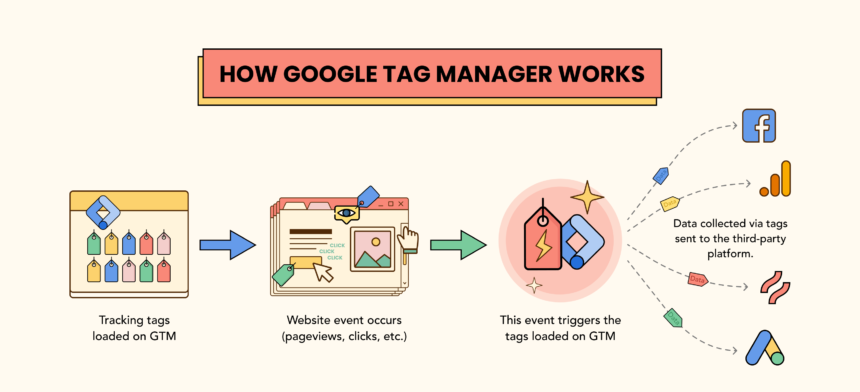Server-Side Tagging with Google Tag Manager: A Privacy-First Setup for Nigerian Websites
In an era where digital privacy is paramount, website owners in Nigeria are increasingly seeking ways to balance effective data collection with stringent data protection requirements. Server-side tagging using Google Tag Manager (GTM) emerges as a powerful solution, allowing for enhanced control over user data while minimizing exposure to third-party trackers. This approach shifts tag processing from the user’s browser to a secure server environment, reducing risks associated with client-side vulnerabilities. For Nigerian websites, this setup aligns perfectly with the Nigeria Data Protection Act (NDPA), which emphasizes lawful data processing, consent, and minimization of personal data handling. This article explores the fundamentals of server-side tagging, its benefits for privacy compliance, and a practical guide to implementation tailored to the Nigerian context.
Understanding Server-Side Tagging
Server-side tagging represents a shift from traditional client-side methods, where tags—small pieces of code for tracking user interactions—are executed directly in the visitor’s browser. Instead, data is sent to a dedicated server where tags are processed before being forwarded to analytics or marketing platforms. This intermediary step allows website administrators to filter, anonymize, or enrich data without exposing sensitive information to external vendors.
In contrast to client-side tagging, which can be blocked by ad blockers or privacy-focused browser extensions, server-side processing operates in a controlled environment. It enables first-party data collection, making it harder for users to circumvent tracking while still respecting privacy preferences. For businesses operating online, this means more reliable insights without compromising user trust.
The Role of Google Tag Manager
Google Tag Manager is a free tool that simplifies the management of website tags, eliminating the need for extensive coding. With its server-side variant, GTM extends this functionality to a cloud-based server, providing a centralized hub for tag configuration and deployment.
GTM’s server container acts as a proxy, receiving data from the client-side and routing it securely. This setup supports integration with various tools like Google Analytics, Facebook Pixel, or custom scripts, all while allowing custom logic to be applied on the server. For Nigerian site owners, GTM’s accessibility—requiring no advanced infrastructure—makes it an ideal starting point for privacy-enhanced tracking.
Privacy Considerations in Nigeria
Nigeria’s data protection landscape is governed by the Nigeria Data Protection Regulation (NDPR), which was recently superseded by the Nigeria Data Protection Act (NDPA) in 2023, with further guidelines issued in 2024. These regulations mandate that personal data, including that collected via web tracking, must be processed with explicit consent, for legitimate purposes, and with adequate security measures. Cookies and tracking tools must comply with principles of data minimization and transparency, as outlined in the General Application and Implementation Directive (GAID).
Web tracking in Nigeria often involves handling sensitive user information, such as IP addresses or behavioral data, which could classify as personal data under NDPA. Non-compliance can lead to fines or reputational damage, making privacy-first approaches essential. Server-side tagging addresses these by allowing data redaction—removing identifiable details before sharing—and ensuring consent-based processing.
Benefits for Nigerian Websites
Adopting server-side tagging offers multiple advantages, particularly in a market where internet users are becoming more privacy-conscious. Firstly, it enhances data privacy by obfuscating user information and limiting third-party access, directly supporting NDPA compliance. This is crucial for e-commerce sites in Nigeria, where trust in data handling can influence customer loyalty.
Secondly, it improves website performance. By offloading tag execution to the server, page load times decrease, benefiting users on mobile networks common in Nigeria. Thirdly, it provides better data accuracy and control, as server-side logic can validate and enrich incoming data streams.
Additionally, it mitigates the impact of ad blockers, ensuring more comprehensive analytics. For Nigerian businesses, this translates to optimized marketing campaigns and informed decision-making without violating local laws.
Step-by-Step Setup Guide
Setting up server-side tagging with GTM is straightforward, though it requires some technical steps. Here’s a tailored guide for Nigerian users:
1. Create a Server Container in GTM: Log into your GTM account at tagmanager.google.com. Under Admin, create a new container and select “Server” as the type.
2. Provision a Tagging Server: Use Google Cloud Platform (GCP) for hosting. Opt for App Engine or Cloud Run for cost-effective scaling. Follow GTM’s prompts to automatically provision or set it up manually. Nigerian users can leverage GCP’s global regions for low-latency.
3. Configure Client-Side to Server Communication: Update your website’s GTM script to point to your custom domain (e.g., tags.yoursite.com). This involves DNS setup for subdomain mapping.
4. Set Up Tags and Clients: In the server container, add clients (e.g., for GA4) and tags. Use variables to handle data filtering for privacy.
5. Test and Deploy: Preview the setup in GTM’s debug mode, ensure consent checks are in place, and publish. Monitor for compliance with NDPA by logging data flows.
Consider using third-party hosting like Stape.io if managing GCP seems complex.
Related article: Top Website Hosting Providers for Nigerian Businesses (2025 Review)
Best Practices
To maximize effectiveness, integrate consent management platforms that align with NDPA requirements, such as obtaining unambiguous consent for tracking. Regularly audit data flows to ensure minimal personal data is processed. Use custom loaders to prevent tag blocking and keep your setup updated with GTM’s latest features. For Nigerian sites, document all processes for potential NDPC audits.
Conclusion
Server-side tagging with Google Tag Manager offers Nigerian websites a robust, privacy-first framework for data collection in a regulated environment. By prioritizing user consent and data security, businesses can foster trust while gaining valuable insights. As digital regulations evolve, adopting such technologies ensures long-term compliance and competitiveness. Start with a small implementation to experience the benefits firsthand, and consult local data protection experts for tailored advice.







Your blog has become an indispensable resource for me. I’m always excited to see what new insights you have to offer. Thank you for consistently delivering top-notch content!